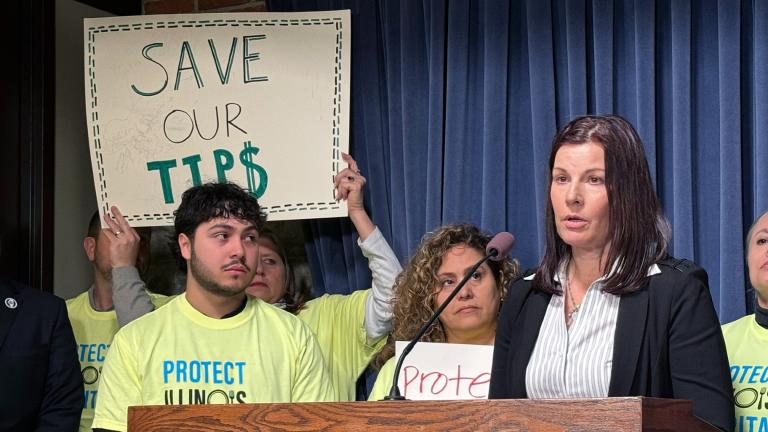Ald. Jessie Fuentes (26th Ward) is sponsoring a Chicago ordinance that would eliminate the subminimum wage for tipped workers. Why?
- Currently, tipped workers such as restaurant servers, bartenders, bussers and runners make a subminimum wage of $9.48 per hour.
- Chicago’s current minimum wage for all other workers is $15.80 per hour for companies with at least 21 employees. (It’s $15 for companies with 20 employees or less.)
- When an employee’s hourly wage plus tips doesn’t add up to $15.80, employers are currently required by law to make up the difference.
- The ordinance now being considered would phase out the city’s lower wage for tipped workers over a two-year period, and it has the backing of Mayor Brandon Johnson.
Opponents fear the move could lead to reduced hours for workers, as well as layoffs, restaurant automation and even closings.
“Let’s talk about the places where ordinance like this have passed. … There’s California, Oregon, Washington and Washington, D.C., and Minnesota. We’ve seen in those places, menu prices increase dramatically,” said Amarit Dulyapaibul, managing partner at Lettuce Entertain You Restaurants. “We see in those places hours being cut, people with less seniority and people with less experience, their jobs are being eliminated. We see technology and automation replacing humans. So we don’t want that for sure.”
“Our profit margins already are tight, and I think often the persons making these decisions are removed from what we have to deal with daily, such as higher property taxes every year,” said Mario Ponce, owner of Takito Brands. “They’ve raised a minimum wage for the last seven years in a row — $1. $1. $1, $1. So every July 1, we have to increase our wages by $1. … I think that the harder part for us is that everything is more expensive for us. Cost of goods, labor, just being in business, everyday materials are more expensive. Insurance, energy bills, have gotten as high as 20% more than last year, which is ridiculous. So the cost of doing business has increased. And the biggest challenge for us is we can’t raise prices high enough, fast enough. That’s really the rub.”
Supporters of the ordinance, including 25 alderpeople who have signed on as co-sponsors, say that it’s time to pay workers fairly.
“Here in the city of Chicago, we know that women, particularly women of color, suffer from discrimination and sexual harassment on the job and are less likely to get the tips that are going to get them to the minimum wage,” Fuentes said. “We have something here that can work. It’s been implemented in seven other states. Let’s get folks to the minimum wage, get them with tips on top. It’s better for the economy, it’s better for families, and we’ll get folks, particularly women of color, out of poverty. … The average one-bedroom apartment in some of the communities in my ward are $1,800 a month. What we are saying is that women, women with families, deserve to work in the hospitality industry, provide for their families and not have to work two to three jobs to do so.”
The organization One Fair Wage is fighting to eliminate the subminimum wage nationally. Nataki Rhodes, One Fair Wage’s national lead organizer, said that the Illinois Restaurant Association and restaurant owners have used scare tactics in the past to defeat proposals to raise the subminimum wage for tipped workers. “In California, Alaska, Minnesota, Oregon (where similar laws have passed), business is still booming. Stop saying it’s going to be a tragedy to Chicago. … $9.48 cents plus getting their tips, that’s not a living wage. If they receive $15 an hour with tips on top, that is a living wage. And also folks are already paying $15 an hour. It’s called the Great Resignation. Folks left restaurants because of low wages. They’re not coming back because of low wages.”
So, what’s next?
The ordinance is expected to head over to the Workforce Development Committee on Thursday. Fuentes believes there’s room for negotiation over the length of time it takes to phase in the change in order to reach a 26-vote majority. The proposal now has a two-year ramp up to the $15.80 minimum wage. Fuentes hopes the full City Council will vote on the ordinance at the Oct. 17 meeting.
“I’m confident we have those votes,” Fuentes told reporters last week. “We have individuals who are going to continue to put information out as a tactic to instill fear in our restaurant owners and the industry at large. And so there’s more obligation here to ensure that we continue to educate people across the city of Chicago, our workers, our restaurant owners, our colleagues and City Council.”








